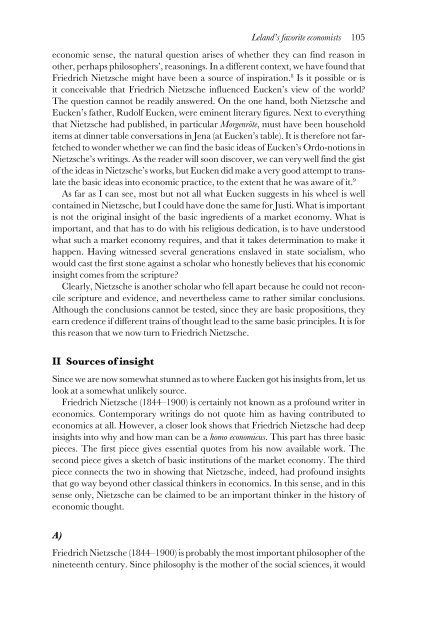Money and Markets: Essays in Honor of Leland B. Yeager
Money and Markets: Essays in Honor of Leland B. Yeager
Money and Markets: Essays in Honor of Leland B. Yeager
You also want an ePaper? Increase the reach of your titles
YUMPU automatically turns print PDFs into web optimized ePapers that Google loves.
Lel<strong>and</strong>’s favorite economists 105economic sense, the natural question arises <strong>of</strong> whether they can f<strong>in</strong>d reason <strong>in</strong>other, perhaps philosophers’, reason<strong>in</strong>gs. In a different context, we have found thatFriedrich Nietzsche might have been a source <strong>of</strong> <strong>in</strong>spiration. 8 Is it possible or isit conceivable that Friedrich Nietzsche <strong>in</strong>fluenced Eucken’s view <strong>of</strong> the world?The question cannot be readily answered. On the one h<strong>and</strong>, both Nietzsche <strong>and</strong>Eucken’s father, Rudolf Eucken, were em<strong>in</strong>ent literary figures. Next to everyth<strong>in</strong>gthat Nietzsche had published, <strong>in</strong> particular Morgenröte, must have been householditems at d<strong>in</strong>ner table conversations <strong>in</strong> Jena (at Eucken’s table). It is therefore not farfetchedto wonder whether we can f<strong>in</strong>d the basic ideas <strong>of</strong> Eucken’s Ordo-notions <strong>in</strong>Nietzsche’s writ<strong>in</strong>gs. As the reader will soon discover, we can very well f<strong>in</strong>d the gist<strong>of</strong> the ideas <strong>in</strong> Nietzsche’s works, but Eucken did make a very good attempt to translatethe basic ideas <strong>in</strong>to economic practice, to the extent that he was aware <strong>of</strong> it. 9As far as I can see, most but not all what Eucken suggests <strong>in</strong> his wheel is wellconta<strong>in</strong>ed <strong>in</strong> Nietzsche, but I could have done the same for Justi. What is importantis not the orig<strong>in</strong>al <strong>in</strong>sight <strong>of</strong> the basic <strong>in</strong>gredients <strong>of</strong> a market economy. What isimportant, <strong>and</strong> that has to do with his religious dedication, is to have understoodwhat such a market economy requires, <strong>and</strong> that it takes determ<strong>in</strong>ation to make ithappen. Hav<strong>in</strong>g witnessed several generations enslaved <strong>in</strong> state socialism, whowould cast the first stone aga<strong>in</strong>st a scholar who honestly believes that his economic<strong>in</strong>sight comes from the scripture?Clearly, Nietzsche is another scholar who fell apart because he could not reconcilescripture <strong>and</strong> evidence, <strong>and</strong> nevertheless came to rather similar conclusions.Although the conclusions cannot be tested, s<strong>in</strong>ce they are basic propositions, theyearn credence if different tra<strong>in</strong>s <strong>of</strong> thought lead to the same basic pr<strong>in</strong>ciples. It is forthis reason that we now turn to Friedrich Nietzsche.II Sources <strong>of</strong> <strong>in</strong>sightS<strong>in</strong>ce we are now somewhat stunned as to where Eucken got his <strong>in</strong>sights from, let uslook at a somewhat unlikely source.Friedrich Nietzsche (1844–1900) is certa<strong>in</strong>ly not known as a pr<strong>of</strong>ound writer <strong>in</strong>economics. Contemporary writ<strong>in</strong>gs do not quote him as hav<strong>in</strong>g contributed toeconomics at all. However, a closer look shows that Friedrich Nietzsche had deep<strong>in</strong>sights <strong>in</strong>to why <strong>and</strong> how man can be a homo economicus. This part has three basicpieces. The first piece gives essential quotes from his now available work. Thesecond piece gives a sketch <strong>of</strong> basic <strong>in</strong>stitutions <strong>of</strong> the market economy. The thirdpiece connects the two <strong>in</strong> show<strong>in</strong>g that Nietzsche, <strong>in</strong>deed, had pr<strong>of</strong>ound <strong>in</strong>sightsthat go way beyond other classical th<strong>in</strong>kers <strong>in</strong> economics. In this sense, <strong>and</strong> <strong>in</strong> thissense only, Nietzsche can be claimed to be an important th<strong>in</strong>ker <strong>in</strong> the history <strong>of</strong>economic thought.A)Friedrich Nietzsche (1844–1900) is probably the most important philosopher <strong>of</strong> then<strong>in</strong>eteenth century. S<strong>in</strong>ce philosophy is the mother <strong>of</strong> the social sciences, it would
















